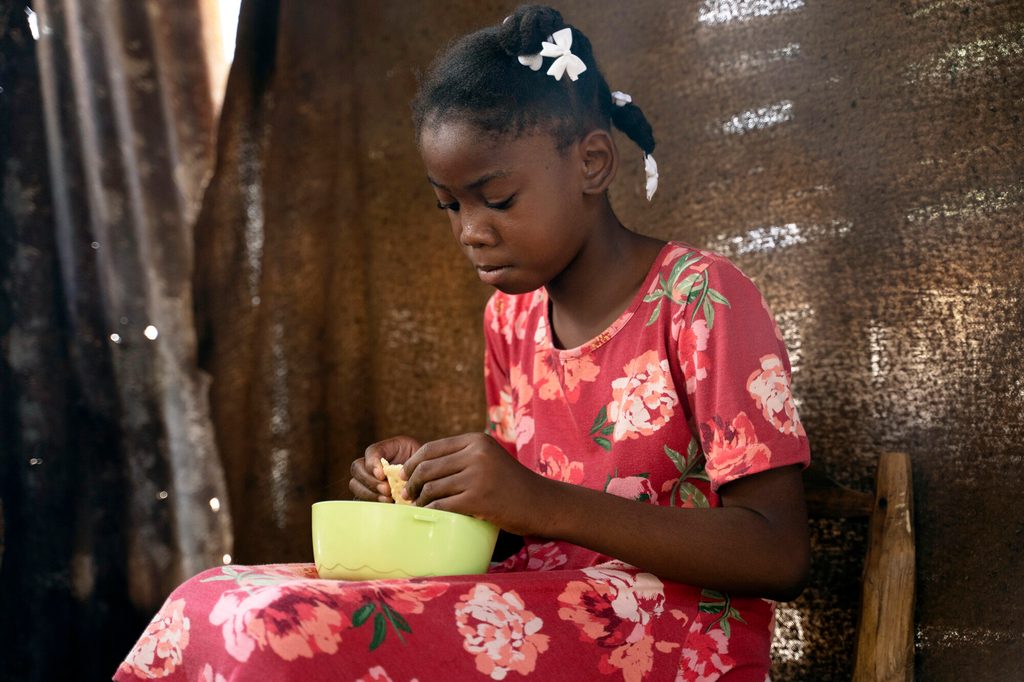Hunger Catastrophe Devastates Haiti
Plan International warns urgent action is needed
4 October 2024Plan International is raising the alarm following the latest Integrated Food Security Phase Classification (IPC) report, which reveals that at least 6,000 people in Haiti, including children and adolescents, are experiencing catastrophic levels of hunger and the collapse of their livelihoods, classified at IPC Phase 5 (Catastrophe), i.e. on the brink of famine. This is due to escalating political instability, economic collapse, violence and extreme weather conditions.

The country is experiencing the most severe level of food insecurity so far, and, without immediate intervention, the situation could have even more severe consequences. “Children and youth should never have to suffer from famine,” said Johnson Bien-Aime, Country Director for Plan International in Haiti. “But today, more than 5.4 million people in Haiti are suffering from high levels of acute food insecurity, and children are the most affected by this catastrophe. Families are forced to make difficult choices: parents are skipping meals so their children can eat, but even these sacrifices are no longer enough. Without immediate action, more lives will be tragically lost.
About the IPC Report
The IPC report has also highlighted that an additional 2 million people (18% of the population analyzed) face critical levels of acute food insecurity, classified at IPC Phase 4 (Emergency). In addition, almost half of the population (48 per cent) face high levels of acute food insecurity, classified as Crisis or worse (IPC Phase 3 or higher) between August 2024 and February 2025. The impact on children and adolescents has been particularly severe, with alarming rates of severe acute malnutrition among the early childhood population.
In times of food crisis, children, in particular girls, bear the greatest burden. As extreme hunger increases, girls often bear the brunt of the consequences, eating less and eating last at home. This vulnerability puts them at greater risk of being taken out of school and forced into early marriages, as families struggle to survive and provide for their children.
According to the latest needs assessment conducted in Port-au-Prince by Plan International Haiti (PIH), it was found that three out of seven groups of people rely on cash and voucher assistance (CVA) distributions to buy food for their families, with the average person eating only once a day. In addition, children between the ages of 6 months and 5 years, as well as pregnant and lactating women, are at serious risk of malnutrition due to lack of adequate resources for proper nutrition.
Since July 2022, Plan International has been working closely with local partners to address the urgent needs of the most vulnerable people, especially girls. However, the situation continues to deteriorate, and more international support is essential to prevent more lives from being lost.
As the crisis worsens, Plan International is stepping up its response through the distribution of food and nutritional supplements, the creation of child-friendly spaces at food distribution points and the provision of integrated child protection services. The organization is working with local authorities to strengthen protection systems and identify vulnerable children in need of additional support.
Plan International is also calling for an urgent increase in funding and humanitarian access to ensure that aid reaches those most in need, specifically children and girls. Scaling up school feeding programs and cash transfer initiatives will be crucial to mitigate the impact of this crisis on children, adolescents and youth.
“The situation is critical, and, without immediate action, more lives will be tragically lost. This crisis was entirely preventable, and there is still time to save lives if the international community acts now,” Bien-Aime concluded.


